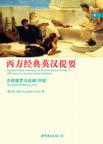西方经典英汉提要(卷一)
出版时间:2010-1-1 出版社:世界图书出版公司北京公司•后浪出版咨询(北京)有限责任公司 作者:(奥)雷立柏 页数:372
Tag标签:无
前言
就早期的来龙去脉而言,欧洲文化的根源在埃及、巴勒斯坦、叙利亚和波斯地区,因此“西方文化”和“西方经典”是有争论的概念。然而从文学和思想来看,古希腊的传统在人类思想史上形成了一种很关键的新开端。因此,本系列从荷马开始梳理欧洲经典的悠久传统,其目标是提供关于一些重要著作及其作者的基本知识。当然,仅仅轮廓性地描述一部经典的内容是远远不够的,应该还要鉴定每一部经典在文学史及思想史上的位置和影响,又要提供一些分析和解释,以及关于该著作的研究书目。不过,这一切都超出本系列的范围。欧洲文化以及西方思想史应该被视为一个整体。这就意味着人们应该研究每一个时代的作者以及前后著作之间的关联。一种比较全面的角度也应该注意到不同的知识领域,因为一些作者可能通过诗歌表达一些哲学理念或他们会将神话与历史结合起来。因此,文学、历史、哲学、法律和宗教在很多古代经典中是分不开的。比如奥古斯丁的《上帝之城》谈论历史、伦理、政治、神话学、宗教信仰以及解释学的问题。
内容概要
自严复翻译西方政法诸书至今,汉语学界数代学人为窥西学堂奥,凭借个人禀赋和志趣选译西方经典,锱铢相累,可谓夥矣。然而,并不是每个人都有机会和能力直接阅读经典,另外,如果缺乏看待西方经典的整全视野和正确心态,启迪心智的经典读物也可能成为“毒物”。因此,一套优秀的辅助性读物就是必需的,这套《西方经典英汉提要》就是为此目的而写。 本书为五卷本《西方经典英汉提要》第一卷。作者精选公元前800年到公元150年间希腊与罗马经典著作100余部,内容涵括文学、史学、哲学、法学和宗教学诸领域,以简易流畅的英、汉双语概写著作的主要内容。书后附有关键词汇、人名、书名的拉丁、希腊、英、汉四语索引,包含丰富的语文学资料。本书适合广大西方文化爱好者阅读,也可用作研习古典语文学的初阶教材。
作者简介
雷立柏(Leopold Leeb),古典语文学家。1967年生于奥地利Hollabrunn,1985年入大学(Hochschule St. Gabriel)学习哲学、宗教学、基督教神学。1988至1991年在台北辅仁大学学习汉语和中国哲学,后回奥地利继续上大学。1995年获得硕士学位后来到北京,考入北京大学哲学系博士班,在汤一介先生和陈来先生的指导下完成博士论文《张衡、科学与宗教》,1999年获得博士学位。1999年到2004年1月在中国社会科学院世界宗教所进行翻译和研究,并开始教授欧洲古代语言(拉丁语,古希腊语,古希伯来语)。2004年2月至今任教于中国人民大学文学院,开设“拉丁语基础”;“古希腊语基础”;“拉丁语文学史”;“古希腊语文学史”;“古希腊文化概论”;“欧洲中世纪文学史”;“古希伯来语”等课程,广受学生赞誉。汉语著作:《张衡、科学与宗教》(2000年出版),《论基督之大与小•1900-1950年间华人知识分子眼中的基督教》(2000年),《圣经的语言和思想》(2000年),《古希腊罗马与基督宗教》(2002年),《基督宗教知识辞典》(2003年),《拉丁成语辞典》(2006年),《古希腊罗马及教父时期名著名言词典》(2007年),《汉语神学术语辞典》(2007年),《拉-英-德-汉法律格言词典》(2008年)。校对的或部分上翻译的著作包括:白舍客《基督宗教伦理学》(上海三联,2002年),拉辛格《基督教导论》(上海三联,2002年),吴经熊《超越东西方》(2002年,社科文献),毕尔迈尔《古代教会史》(2009年,宗教文慧),《韦洛克拉丁语教程》(2009年,世界图书)。研究方向和兴趣:翻译问题,科学与宗教,欧洲古代语言和思想,古典语文学,欧洲中世纪思想史,基督宗教文化传统,古代经典的解释,比较成语学。
书籍目录
《西方经典英汉提要》总序序第一篇 早期希腊文学(公元前800年到前480年) 荷马 001.《伊利亚特》 002.《奥德赛》 赫西奥德 003.《农作与时日》 004.《神谱》 伊索 005.《寓言集》第二篇 古典时期的希腊文学(公元前480年到前320年) 埃斯库罗斯 006.《波斯人》 007.《俄瑞斯特斯》 索福克勒斯 008.《安提戈涅》 009.《俄狄浦斯王》 010.《俄狄浦斯在科罗诺斯》 011.《厄勒克特拉》 欧里庇得斯 012.《阿尔刻提斯》 013.《希波吕托斯》 014.《伊菲格涅亚在奥利斯》 015.《美狄亚》 希罗多德 016.《历史》 修昔底德 017.《伯罗奔尼撒战争史》 阿里斯托芬 018.《阿卡奈人》 019.《和平》 020.《吕西斯忒拉忒》 021.《云》 022.《鸟》 023.《黄蜂》 色诺芬 024.《远征记》 025.《管理家庭》 柏拉图 026.《申辩篇》 027.《高尔吉亚篇》 028.《美诺篇》 029.《斐多篇》 030.《理想国》 031.《会饮篇》 032.《提迈欧篇》 亚里士多德 033.《尼各马可伦理学》 034.《动物志》 035.《工具论》 036.《诗学》 037.《物理学》 038.《政治学》 039.《形而上学》 040.《修辞学》第三篇 希腊化时期和早期拉丁文学(公元前320年到前100年) 泰奥弗拉斯托斯 041.《品格论》 米南德 042.《恨世者》 欧几里得 043.《几何原本》 阿波罗尼俄斯 044.《阿戈远征记》 普劳图斯 045.《安菲特律翁》 046.《一坛黄金》 047.《吹牛的军人》 波利比奥斯 048.《通史》 泰伦斯 049.《两兄弟》 050.《自责者》 051.《福尔米翁》第四篇 古典拉丁文学黄金时代(公元前100年到公元20年) 瓦罗 052.《论拉丁语》 西塞罗 053.《布鲁图斯》 054.《论老年生活》 055.《论至善》 056.《论诸神的本性》 057.《论占卜》 058.《论义务》 059.《论国度》 060.《图斯库卢姆谈话录》 恺撒 061.《高卢战记》 卢克莱修 062.《物性论》 维特鲁威 063.《建筑学》 萨卢斯特 064.《喀提林叛乱记》 普珀里琉斯 065.《成语集》 维吉尔 066.《埃涅亚特》 067.《牧歌》 068.《农事诗》 贺拉斯 069.《歌集》 070.《诗艺》 071.《讽刺诗集》 李维 072.《罗马通史》 奥维德 073.《爱的艺术》 074.《岁时记》 075.《女英雄》 076.《变形记》第五篇 罗马帝国和拉丁文学白银时代(公元20年到150年) 斐洛 077.《世界的创造》 078.《法律的比喻》 塞涅卡 079.《论宽和》 080.《论幸福的人生》 081.《道德信笺》 (老)普林尼 082.《博物志》 昆体良 083.《演讲家的培训》 弗朗蒂努斯 084.《论罗马城的供水问题》 约瑟夫斯 085.《上古犹太史》 086.《犹太战争史》 卢坎 087.《法尔萨利亚》 马尔提阿里斯 088.《警句诗集》 斯塔提乌斯 089.《阿喀琉斯纪》 普卢塔克 090.《希腊罗马人物对比传记》 091.《道德论集》 埃比克泰德 092.《论集》 093.《手册》 依纳爵 094.《信集》 塔西佗 095.《编年史》 096.《日耳曼志》 朱文纳尔 097.《讽刺诗集》 苏埃托尼乌斯 098.《诸恺撒传》附录 《圣经》 099.《创世记》 100.《约伯记》 101.《约翰福音》 无名作者 102.《论崇高》拉-希-英-汉索引出版后记
章节摘录
050. Heauton timorumenos / Self-tormentorThis play was written according to the model of a Greek tragedy of Menander and first performed in 163 BC. The prologue tells the audience that some critics say Terence has "combined (contaminasse)a few Latin comedies from many Greek plays". In the history of literature this combination or adaptation is called "contaminatio".The main figure is Menedemus, an old man living in a village close to Athens. He is doing hard labor in the fields, and thus his neighbor Chremes, another old man, is wondering why he is tormenting himself in this way. As Menedemus asks Chremes why he cares about other people's matters, Chremes responds with the famous "homo sum, humani nil a me alienum puto" ("I am a human being and consider nothing human as far from me", vs. 77). Finally Menedemus tells Chremes the reason: he has criticized his son Clinia for having a girl-friend, and Clina was so shaken by these words that he secretly left the house and became a soldier in Asia. Possibly he has already fallen in some battle. Anyway, it is very unlikely that he will ever return home, and Menedemus feels guilty for this. Therefore Menedemus wants to do harsh labor in the fields as a kind of self-imposed punishment. After hearing the story Chremes lectures Menedemus saying a father needs to be indulgent.Meanwhile Clinia has returned from Asia whithout his father's knowledge. He lives in Chremes' house, together with his friend Clitipho, the son of Chremes. He does not dare to return to his father's house. Chremes wants to help to bring about the reconciliation between Clinia and his father, but at the same time he explains to his son Clitipho that Menedemus was right in criticizing his son, and Clitipho should understand this. Clitipho complains about this kind of fatherly rigidity which expects the young men to be mature in every respect like an elderly man. Now the audience gets to know that Clitipho too has a girl-friend, he secretly spends his father's money on the prostitute Bacchis.Two slaves, Syrus and Dromo, plan an intrigue: They want to introduce Clitipho's girl-friend Baechis as the lover of Clinia and so enable her to move openly to Chremes' house. Bacchis comes together with a maid-servent——Clinia's lover Antiphila. Bacchis describes her dire fate as prostitute. Then Clinia and Antiphila are overjoyed to meet again. Chremes wants to tell Menedemus that his son has returned and——believing that Bacchis is Clinia's girl-friend——describes Bacchis' pretentious and luxurious manners. Menedemus does not care much about these matters, he only wants to have his son back. Chremes is worried that Clinia might run away again. As he by chance observes his son Clitipho exchanging some intimacies with Bacchis, he scolds him for this.Syrus tells Chremes that Antiphila iS in his house.saying that she iS under Bacchis'control because Antiphila'S deceased mother owed some money to Bacchis.Bacchis allegedly demands this money from Clinia,and Syrus suggests that Chremes gives the money to Clitipho SO that he can help Clinia.In fact Clitipho needs the money to pay Bacchis.Syrus discovers that Antiphila iS in faet the formerly exposed child of Chremes and his wife Sostrata.that iS to say Antiphila iS a freeborn child and not a slave,as Syrus told Chremes.Syrus iS afraid that Clinia might discover that Antiphila iS not a slave-girl.because then he could easily be reconciled with his father who might not object to a free-born daughter-in-law,and Syrus' intrigue would be revealed.Therefore Syrus tries to persuade Clinia to take Bacchis with him and to move to his father Menedemus.SO that Chremes would not discover that Bacchis iS Clitipho'S friend.In a similar way the slave persuades Bacchis who already plans to leave Chremes'house.Syrns tells his master Chremes the truth about the relationships between Clinia. Antiphila.Bacchis and Clitipho.but he tells it in a way that Chremes thinks it iS all lies. Syrus also tells Clitipho that Bacchis iS with Clinia.NOW Chremes comes to Clitipho and hands him over the money for Bacchis.Finally Menedemus tells Chremes that Clinia loves Antiphila and wants to marry her.Chremes iS perplexed but finally finds out that Bacchis iS the real lover of his son Clitipho,and that he has been cheated.Chremes who has preached tolerance iS furious.and Menedemus has to prevent Chremes from expelling his own son.After everything has been revealed,Chremes agrees to give his daughter Antiphila in marriage to Clinia.He scolds Clitipho and announces that he will disinherit his son。Syrus suggests to Clitipho that he ask his parents whether he really is their son.because it seems that after they have found Antiphila they simply discard him. In the conversation with his parents.Clitipho gets a confirmation that he iS really his parents'son.He iS reconciled to his father and asks him not to punish Syrus.the master-mind of all the intrigues.
后记
古典语文学家尼采推崇这样一种阅读的德行:语文学是一门让人尊敬的艺术,要求其崇拜者最重要的:走到一边,闲下来,静下来和慢下来——它是词的金器制作术和金器鉴赏术,需要小心翼翼和一丝不苟地工作;如果不能缓慢地取得什么东西,它就不能取得任何东西。但也正因为如此,它在今天比在任何其他时候都更为不可或缺;在一个“工作”的时代,在一个匆忙、琐碎和让人喘不过气来的时代,在一个想要一下子“干掉一件事情”、干掉每一本新的和旧的著作的时代,这样一种艺术对我们来说不啻沙漠中的清泉,甘美异常。——这种艺术并不在任何事情上立竿见影,但它教我们以好的阅读,即,缓慢地、深入地、有保留和小心地,带着各种敞开大门的隐秘思想,以灵敏的手指和眼睛,阅读……(《朝霞》,“序言”,条5)尼采的感觉是对的,在“工作”的时代,“闲”、“静”、“慢”乃是一种恶德。“柔和的慢板”叫不醒“劳动动物”现代人的耳朵,嘈嘈切切鼓荡难平的心气怎能欣赏语文学这“浪漫的垃圾”?尼采写下这段话一百多年后,哈罗德·布鲁姆在《西方正典》的中文版序言中,不无怨气地指摘他所谓的“憎恨学派”:“西方经典已被各种诸如此类的十字军运动所代替,如后殖民主义、多元文化主义、族裔研究,以及各种关于I生倾向的奇谈怪论。”不难看出,不仅尼采欣赏的阅读技艺几近失传,连阅读的对象——经典文本的地位亦已岌岌可危。现代学者怀抱“比作者更好地理解作品”的圣剑,干掉了一座座经典的城堡。怎么,不是吗?我们是不是已经本能地将《俄狄浦斯王》与恋母情结画上了等号?医神祭司索福克勒斯的教诲——人不可过于狂傲,毕竟不合现代人的胃口呵。看来,即使在两方内部,读什么书,怎么读书,已是众说纷纭。我们这些渴望通过阅读西方典籍开眼看世界的中国人,又该如何在浩瀚的卷帙中遴选呢?又该以什么态度去阅读呢?
编辑推荐
《西方经典英汉提要:古希腊罗马经典100部》:至今保存其著作的最早希腊诗人大约生活在公元前750年。在公元前5世纪古希腊文学走向一个令人敬仰的高峰,并且希腊人的文字、文献和思想已开始传到地中海世界的许多地区。亚历山大(Alexandros)的征服也是希腊化时期的开端,而那个时期的学者重新编写、分析和解释早期的著作。罗马人的文学在很大的程度上受了希腊文献的熏陶和启迪。很多古罗马思想家曾经去希腊留学并精通希腊语。西塞罗(Cicero)谈论古希腊的演说家和哲学学派,而维吉尔(Vergilius)从一个新的角度发挥荷马(HomSros)的著作,这就说明希腊语和拉丁语文学传统之间的复杂关系。正如古希腊文学的“古典时期”(约公元前480年到公元前330年)不长,拉丁文学的“黄金时代”(约公元前100年到公元20年)也很快就结束了。然而,在奥古斯都(Augustus)皇帝去世后,希腊和罗马的作者继续创造了一些不朽的作品。在西方文学、思想和艺术史上最有影响的经典可能是《圣经》,而其中的《新约>部分成书于1世纪下半叶。因此我们可以说大约在公元150年西方文学、历史学、哲学和宗教学上的奠基性经典都定型了,而一切后来的创作、历史记载与哲学探讨都建立在这些经典的基础之上。 ——(奥)雷立柏(Leopold Leeb)
图书封面
图书标签Tags
无
评论、评分、阅读与下载
用户评论 (总计9条)
- 说来惭愧,英语学习很多年,对古典西方名著了解太有限。这本书是在时代前提下,概要叙述了经典名著。十六开本,中英对照版,排版上采用左边中文,右边英文的方式。
- 非常好的一本窥探欧洲文学的大门的资料书。
- 有一些印刷和排版错误,汉语版本稍显生硬。总的来说不错,有助于了解古代西方文学。
- 古希腊是科学的发源地,不过可以真的看到古希腊哲人的著作比较难,这本书让我们对那些伟大的哲人以及他们的著作有了更多的了解
- 老师要求要用的。正在学,感觉还不错~
- 短时间内,可以多点知识
- 如果你想学英语,这本书就算了。如果你想读深入研读,这本书就算了。如果你懒得看维基百科,但又想知道古希腊罗马的人写了些什么,那么你就买吧。。
- 虽然只是卷一,介绍到白银年代后不太久,但内容翔实可信,又有双语对照,足见功底。有点可惜书中介绍的《修辞学》不是那本讲记忆术的。印刷简洁大方,装帧也好,尽管正文纸质稍薄。
- 我想这是一部神作,期待后面的四本。
